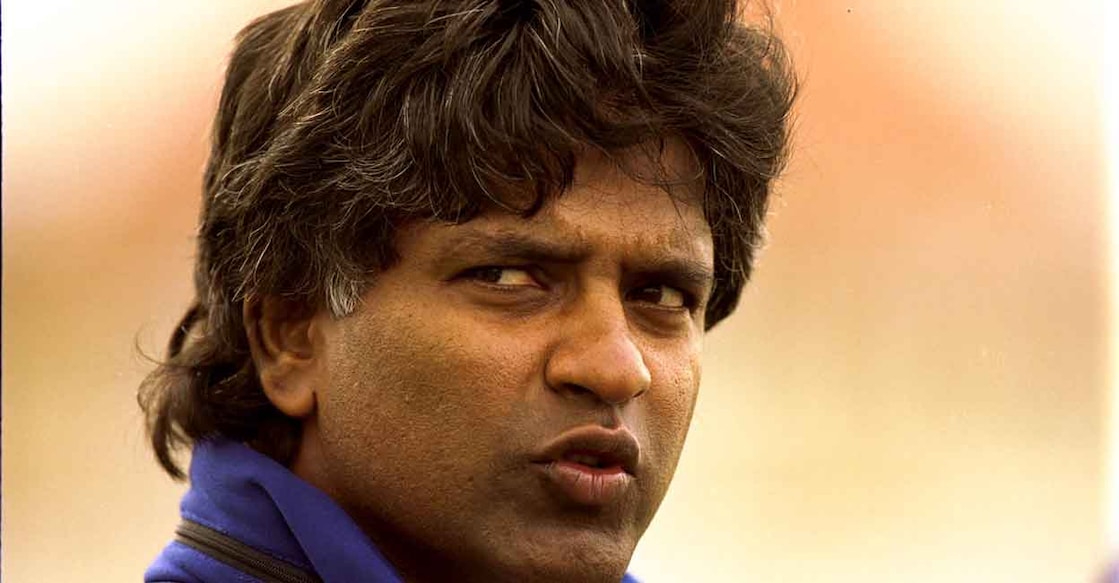Arjuna Ranatunga on Sri Lanka's economic and political turmoil, life after cricket

Mail This Article
Arjuna Ranatunga is best known for leading Sri Lankan cricket to dominate the world with his deft handling of the team.
His captaincy led the island nation to the pinnacle when they lifted the World Cup in 1996.
The outspoken former captain later tried his luck in politics.
Ranatunga opens up to N Jayachandran in Colombo about the latest developments in the country, cricket, and his life after retirement from the game.
"We suffered a lot during the internal strife, but we were happy. We never had to fight in the streets for rice and petrol. The Liberation Tigers of Tamil Eelam (LTTE) even declared a 24-hour ceasefire when we played Australia in the 1996 World Cup final. Cricket succeeded in ushering in peace for at least a day. The war was raging all around when we returned home with the World Cup. But the joy and excitement then were beyond words! But, what is unfolding now? The rulers have stooped to the level of clowns. People are fed up," Ranatunga fumed.
Former Minister for Petroleum Ranatunga was profusely sweating in his office at Thalawathugoda on Parliament Road.
The power outage had been going on for eight hours since 9 am. His defeat at the election as a United National Party candidate was a political backlash for him.
Still, he has been preparing to spearhead a new people's movement in the existing circumstances in Sri Lanka, reeling under a financial crisis.
His brother Prasanna Ranatunga is in the rival political camp -- currently the Minister for Tourism in the Mahinda Rajapaksa and the government's spokesman.
"I have been out under the sweltering sun, and I won't be tired that easily. The government has cheated the poor. People will wonder which under-developed country will have power cuts extending to 14 hours. When I was the petroleum minister, India had expressed willingness to repair 100 British-built oil tanks in Trincomalee and ramp up their storage capacity. The Indian Oil Corporation, too, was interested. But local union leaders opposed the plan. They accused us of surrendering to India. The refineries now in Sri Lanka are of no use. If crude oil is brought to the country and processed here, various products could be produced. Importing fuel will burn a hole in the pocket," Ranatunga said.
He termed the recent deal with India to repair and enhance the capacity of oil tanks in Trincomalee "late realisation".
"I am a fan of India. We grew up watching Gavaskar, Vishwanath and Kapil Dev. I still admire India. I don't have the need to admire China. I had opposed the Hambantota Port deal (with China Merchants Ports Holding Company, a state-owned firm) when I was the minister for ports. Soon after, I lost that portfolio. People should benefit from any investment," the former minister said.
The phone rang midway through the conversation. Sri Lanka's former explosive batter and captain Sanath Jayasuriya was at the other end. The call was regarding a planned charity match involving the 1996 stars at Batticaloa the next week. The match was to publicise an 80,000-seat stadium planned by a Sri Lankan settled in Britain.
"I don't play cricket now. I ride a cycle for 30 minutes and fast for 12 hours. After dinner, my next meal is lunch, but I will have black tea in between. I have shed eight kilograms," Ranatunga said while running his fingers through his grey hair. "Cricket has undergone a drastic change. The IPL has become a huge revenue-garnering brand. Here, Sri Lankan cricket is searching for a sponsor," Ranatunga said while opening a window, hoping for a soothing breeze.

